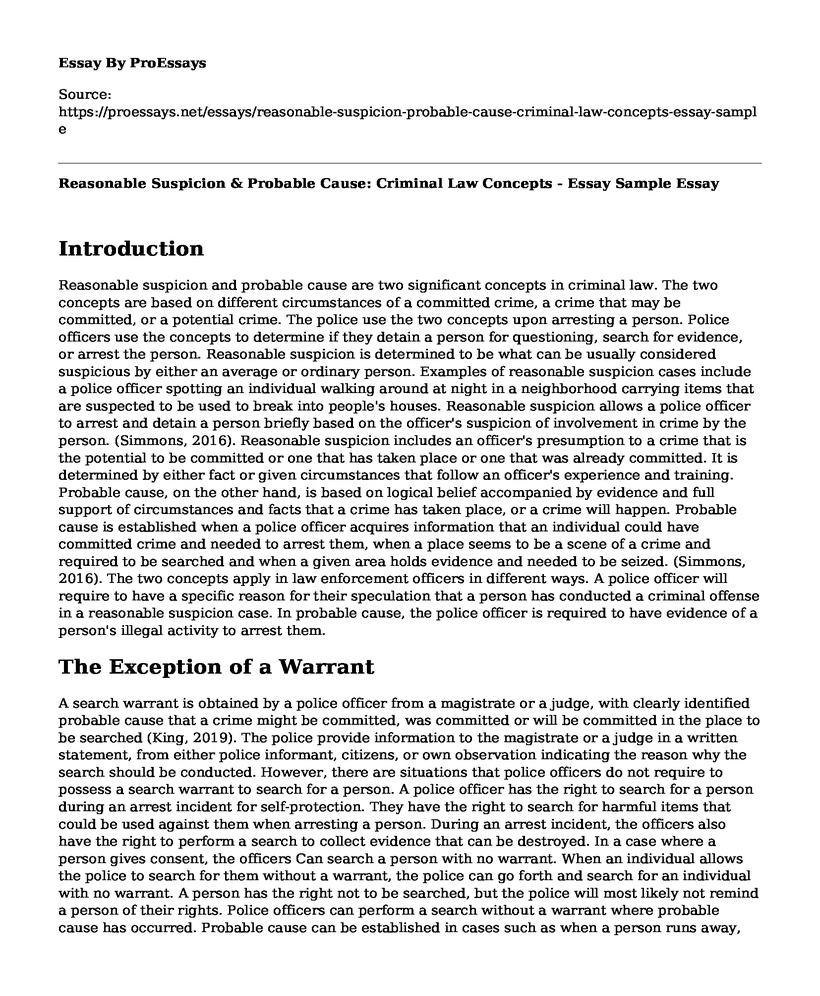Introduction
Reasonable suspicion and probable cause are two significant concepts in criminal law. The two concepts are based on different circumstances of a committed crime, a crime that may be committed, or a potential crime. The police use the two concepts upon arresting a person. Police officers use the concepts to determine if they detain a person for questioning, search for evidence, or arrest the person. Reasonable suspicion is determined to be what can be usually considered suspicious by either an average or ordinary person. Examples of reasonable suspicion cases include a police officer spotting an individual walking around at night in a neighborhood carrying items that are suspected to be used to break into people's houses. Reasonable suspicion allows a police officer to arrest and detain a person briefly based on the officer's suspicion of involvement in crime by the person. (Simmons, 2016). Reasonable suspicion includes an officer's presumption to a crime that is the potential to be committed or one that has taken place or one that was already committed. It is determined by either fact or given circumstances that follow an officer's experience and training. Probable cause, on the other hand, is based on logical belief accompanied by evidence and full support of circumstances and facts that a crime has taken place, or a crime will happen. Probable cause is established when a police officer acquires information that an individual could have committed crime and needed to arrest them, when a place seems to be a scene of a crime and required to be searched and when a given area holds evidence and needed to be seized. (Simmons, 2016). The two concepts apply in law enforcement officers in different ways. A police officer will require to have a specific reason for their speculation that a person has conducted a criminal offense in a reasonable suspicion case. In probable cause, the police officer is required to have evidence of a person's illegal activity to arrest them.
The Exception of a Warrant
A search warrant is obtained by a police officer from a magistrate or a judge, with clearly identified probable cause that a crime might be committed, was committed or will be committed in the place to be searched (King, 2019). The police provide information to the magistrate or a judge in a written statement, from either police informant, citizens, or own observation indicating the reason why the search should be conducted. However, there are situations that police officers do not require to possess a search warrant to search for a person. A police officer has the right to search for a person during an arrest incident for self-protection. They have the right to search for harmful items that could be used against them when arresting a person. During an arrest incident, the officers also have the right to perform a search to collect evidence that can be destroyed. In a case where a person gives consent, the officers Can search a person with no warrant. When an individual allows the police to search for them without a warrant, the police can go forth and search for an individual with no warrant. A person has the right not to be searched, but the police will most likely not remind a person of their rights. Police officers can perform a search without a warrant where probable cause has occurred. Probable cause can be established in cases such as when a person runs away, when a person makes sudden movement or when a gunshot has been heard. Police can also perform a search in an exigent circumstance. If the officers feel like the time used in getting a warrant can jeopardize the safety of the public or could lead to evidence loss, they can perform a search without an authorization. The resources used in this research have indicated how the two concepts of criminal law apply, noting the similarities and differences of the concepts. The sources have also noted the different situations where a warrant is excepted during an arrest or a search by police officers.
References
Simmons, R. (2016). Quantifying Criminal Procedure: How to Unlock the Potential of Big Data in Our Criminal Justice System. Mich. St. L. Rev., 947.
King, R. B. (2019). In re Search Warrant Issued June 13, 2019. Collections, 2019, 10-31.
Cite this page
Reasonable Suspicion & Probable Cause: Criminal Law Concepts - Essay Sample. (2023, Aug 01). Retrieved from https://proessays.net/essays/reasonable-suspicion-probable-cause-criminal-law-concepts-essay-sample
If you are the original author of this essay and no longer wish to have it published on the ProEssays website, please click below to request its removal:
- Essay Sample on Social Construction of Difference in Sexuality
- Essay on Fair Minded Qualities
- Paper Example on Blended Sentence Statutes
- Permitting Policies and Benefits of Concealed Carry Paper Example
- Youth Gangs and Crime: A Societal Challenge - Essay Sample
- Children in Courts: From 1895 to Present - Essay Sample
- Essay Example on Two Revolutionary Lives: Martin & Malcolm Fight for Equality







